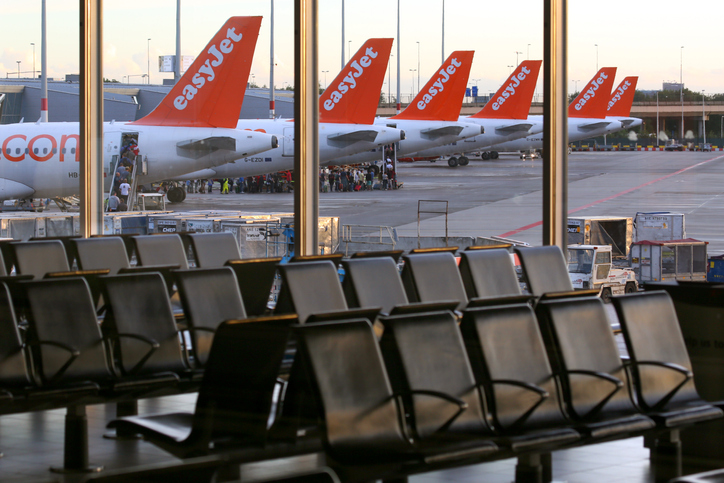ii view: easyJet enjoys stronger than expected bookings
Its shares have more than halved in 2020. Is the worst now over for this budget airline?
4th August 2020 16:00
by Keith Bowman from interactive investor
Its shares have more than halved in 2020. Is the worst now over for this budget airline?

Third-quarter trading to 30 June
- Revenue down 99.6% to £7 million
- A loss before tax of £324.5 million, down from a profit of £174.2 million
- Quarterly costs fell 79% to £332.1 million compared to Q3 2019
- Net debt of £835 million, up from £467 million in late March
Guidance:
- Expects to fly 40% of planned capacity for Q4 2020, up from a previous 30% estimate
- Expects a smaller Q4 loss than reported this quarter
- Offering no full-year estimates
Chief executive Johan Lundgren said:
"I am really encouraged that we have seen higher than expected levels of demand with load factor of 84% in July with destinations like Faro and Nice remaining popular with customers.
"Our bookings for the remainder of the summer are performing better than expected and as a result we have decided to expand our schedule over the fourth quarter to fly c.40% of capacity.
"As we look ahead, I am confident that easyJet will continue to serve our customers well, delivering our renowned friendly service and value across our unrivalled network."
ii round-up:
Low-cost airline easyJet (LSE:EZJ) plans to fly 40% of its planes over the summer compared to previous estimate of 30%, fuelled by higher than expected customer demand.
Aided by measures to cut costs and conserve cash, it burnt through a total of £774 million in the quarter to the end of June, down from a prior expectation of around £1 billion.
easyJet shares rose by over 9% in UK afternoon trading having more than halved year-to-date. Shares for rival budget airline Ryanair (LSE:RYA)are down by a quarter in 2020, while global carriers IAG (LSE:IAG) and Air France-KLM (EURONEXT:AF) have seen their shares fall by 72% and 65% respectively.
An operating loss of £324.5 million is expected to reduce in the next fourth quarter period as the number of flights easyJet operates increases from almost zero back in April.
Earlier in the year the Luton headquarter company announced that it was cutting its 2021 fleet size to around 302 aircraft, a reduction of 51 planes from its pre-Covid estimate as it looks to resize under the pandemic.
British Airways owner IAG recently mirrored easyJet management’s prior expectation for it to take until at least 2023 for passenger demand to recover to 2019 levels. Ryanair only weeks ago cut its expected full-year passenger numbers from 80 million to 60 million.
The UK government in late July announced new quarantine measures for travellers returning from Spain.
ii view:
easyJet focuses on developing strong positions in Europe’s leading airports. Its five key strategic priorities are to be number one or number two in primary airports, winning customer loyalty, offering value by efficiency, employing the right people and innovating with data.
Investors in any airline company must be prepared for an often turbulent ride. Volatile fuel costs, the threat of terrorism and industrial action by staff can all hit hard. But the Covid pandemic has taken the hit to the industry to a new level.
Actions being taken by management include cutting staff numbers by 30% and selling and leasing back assets. Total liquidity raised during the pandemic and including an application to the Bank of England’s Covid finance scheme, now stands at over £2.2 billion.
For investors, swift action to conserve cash and, hopefully, help see it through the pandemic offer reassurance. Higher than expected customer demand for flights also generates reason for optimism. However, the degree of uncertainty for the outlook remains significant, with easyJet shares still arguably one for brave long-term investors.
Positives:
- Fast action taken to boost cash liquidity
- Previously launched a holiday business to try and capture accommodation bookings
Negatives:
- Market demand not expected to recover to 2019 levels until 2023
- Many factors outside of management’s control can impact performance
The average rating of stock market analysts:
Strong hold
These articles are provided for information purposes only. Occasionally, an opinion about whether to buy or sell a specific investment may be provided by third parties. The content is not intended to be a personal recommendation to buy or sell any financial instrument or product, or to adopt any investment strategy as it is not provided based on an assessment of your investing knowledge and experience, your financial situation or your investment objectives. The value of your investments, and the income derived from them, may go down as well as up. You may not get back all the money that you invest. The investments referred to in this article may not be suitable for all investors, and if in doubt, an investor should seek advice from a qualified investment adviser.
Full performance can be found on the company or index summary page on the interactive investor website. Simply click on the company's or index name highlighted in the article.